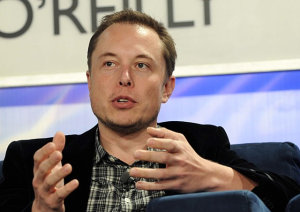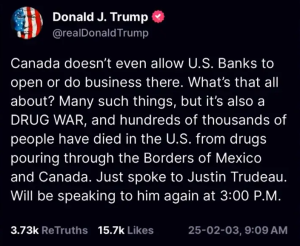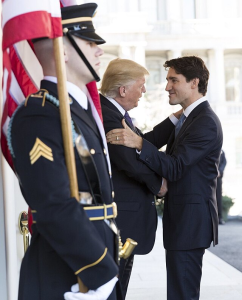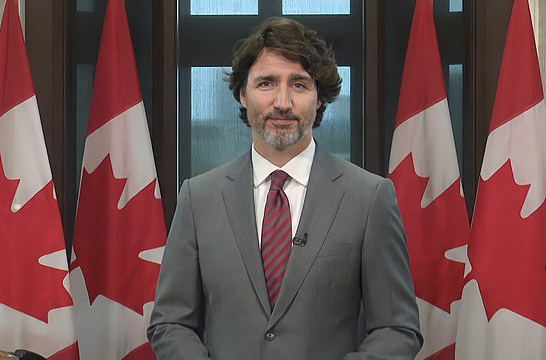Elon Musk and Starlink have formally engaged in the unexpected trade conflict between the United States and Canada, a development attributed to a leader from Ontario.
Prior to assuming the presidency, Donald Trump articulated his intention to impose tariffs on imports originating from both Mexico and Canada, two longstanding allies of the United States. Despite President Trump’s persistent assertions regarding this matter, a considerable number of economists remained sceptical of his intentions.

Up until the previous week. The President fulfilled his commitments by formally imposing a 25% tariff on all imported products originating from Canada and Mexico. He also imposed a 10% tariff on Canadian electricity, crude, and natural gas.
These actions promptly initiated a cascade of turmoil for numerous individuals in Washington, D.C., as well as for those in Canada and Mexico. Both nations promptly announced their intention to impose tariffs on the United States as a form of retaliation.
Merely hours following the announcement of these tariffs by former President Trump, Canadian Prime Minister Justin Trudeau disclosed the imposition of a 25% tariff on products valued at 30 billion Canadian dollars. These commodities encompassed a wide range of items, including paper products and beverages.

Concurrently, an additional list of tariffs would impact a variety of commodities, including fruits, vegetables, beef, automobiles, trucks, and steel products, among numerous others.
Numerous Canadian leaders, spanning the entire political spectrum, concurred with the implementation of these retaliatory tariffs. Officials were incredulous that Trump had genuinely acted upon his threats. Consequently, it was imperative for them to respond with severity.
Elon Musk, a notable supporter of Donald Trump and the current leader of the Department of Government Efficiency (DOGE), was swiftly engaged in the fray by Ontario Premier Doug Ford. Recently, Ford entered into an agreement with Elon Musk’s satellite enterprise, Starlink. This agreement, amounting to $100 million Canadian dollars, was established to facilitate the provision of high-speed internet access to rural regions of Ontario.
At this juncture, it appears that the agreement is no longer viable. Ford announced on X, “We will be terminating the province’s contract with Starlink.” Ontario will not engage in commercial transactions with individuals who are determined to undermine our economy.
Starting today and until U.S. tariffs are removed, Ontario is banning American companies from provincial contracts.
Every year, the Ontario government and its agencies spend $30 billion on procurement, alongside our $200 billion plan to build Ontario. U.S.-based businesses will…
— Doug Ford (@fordnation) February 3, 2025
Ford did not cease its endeavours at that point. The Canadian leader further asserted his intention to prohibit all American companies from participating in the bidding process for any provincial contracts in Ontario. Consequently, Ford asserted that American enterprises would ultimately forfeit “tens of billions of dollars.”
What motivated Ford to implement such drastic measures that adversely affected both Starlink and American-based enterprises? “According to Ford, the sole individual they can hold accountable is President Trump.”
In the concluding remarks of his post on X, Ford cautioned, “Canada did not initiate this conflict with the United States; however, rest assured, we are fully prepared to prevail.”
The leader’s decision to terminate Ontario’s agreement with Starlink has further underscored the extent to which Musk has entwined himself with President Trump and the United States government. In light of Musk’s pursuit of DOGE and his allegiance to Trump, it seems that Ford and other Canadian leaders are seeking to undermine Musk’s enterprises.

Numerous American critics have expressed concerns regarding the extent of Musk’s involvement with the U.S. government, particularly as they believe he lacks the requisite security certification to obtain immediate access to sensitive information.
As these critics have noted, Musk is not an individual holding an elected office. Although he may hold the title of the wealthiest individual globally, he remains merely a private citizen of the United States.
Despite the numerous threats exchanged among the United States, Canada, and Mexico, it seems that this brief trade conflict may be approaching a resolution.
Both Mexico and Canada have entered into distinct agreements with President Trump to suspend tariffs in return for enhanced immigration enforcement and measures to combat fentanyl trafficking at the frontier, which were anticipated to officially commence this week.
Nevertheless, the tariffs were merely suspended until March. Consequently, additional trade disputes among these three nations may potentially arise once more. Under Trump’s leadership, the future remains uncertain.
